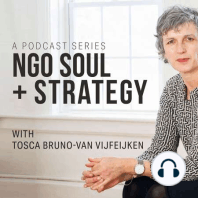41 min listen

026. Right Work and Right Team: how the Ultra-Poor Graduation Initiative (BRAC) is aspiring to become a truly diverse, global entity - Rasha Natour
026. Right Work and Right Team: how the Ultra-Poor Graduation Initiative (BRAC) is aspiring to become a truly diverse, global entity - Rasha Natour
ratings:
Length:
46 minutes
Released:
Jul 22, 2021
Format:
Podcast episode
Description
Summary What are the advantages and disadvantages (if any) when an organization is in a position to start almost as if with a new slate after a large core grant infusion, and thus can propel an ambitious DEI agenda?And how do local authorities and national governments in global South countries respond to a localization push by an initiative like the Ultra Poor Graduation Initiative, part of the large Bangladesh-founded NGO BRAC? In this episode, we talk with Rasha Natour, Senior Advocacy Manager at UPGI, about the Initiative's two strands of DEI-related work: ‘Right Work’ and ‘Right Team’, and the different roles these two approaches play in UPGI becoming a truly global entity.Rasha Natour’s Bio:Sr. Advocacy Manager, Ultra Poor Graduation Initiative (UPGI), at the Bangladesh Rural & Advancement Committee (BRAC) Formerly senior Strategic Direction manager at CARE InternationalFormer Knowledge Management & Global Advocacy, CARE InternationalFormer researcher on civil society at the London School of Economics (LSE) Quotes“We cannot divide external change from the internal change. If we really want to see something happening externally, we need to ensure that we build internally to enable that.”“The way to have more local sustainability is by starting from the very beginning and not just as a consultative process.” We discussed: When a nonprofit received a large core grant (such as the TED Audacious grant in the case of the Ultra Poor Graduation Initiative (UPGI)), it not only obviously allows the organization to expand its programming but also offers that organization security as well as flexibility and agility When it comes to UPGI’s Diversity, Equity, Inclusion, and Belonging work (DEI+B), UPGI operates two workstreams: ‘Right Team’ and ‘Right Work’. Under Right Team, the focus is on how to change the recruitment strategy, how to emphasize DEI+B values in recruitment steps, and how to change UPGI's performance management system ‘Right Work’ relates to how to further shift the locus of decision making and authority to people most close to the impact; and how to work with local civil society in a way that recognizes its autonomy and identity and in a way that supports it in flexible manners The focus throughout UPGI’s work is to center the voices of those closest to the level of impactNote:Since this episode was recorded, BRAC Ultra-Poor Graduation Initiative (UPGI) has begun a transition to move its administrative home from BRAC USA to BRAC International. As BRAC seeks to expand uptake of the Graduation approach worldwide through advocacy and technical advisory services, BRAC UPGI is increasingly hiring more staff in the regions where they work. As the main entity housing BRAC's programs outside of Bangladesh, BRAC International is well-positioned to oversee BRAC UPGI's expansion as a global program.Resources:Linkedin profileTwitter ProfileNGO websiteClick here to subscribe to be alerted when new podcast episodes come out or when Tosca produces other thought leadership pieces.Or email Tosca at tosca@5oaksconsulting.org if you want to talk about your social sector organization’s needs, challenges, and opportunities.You can find Tosca’s content b
Released:
Jul 22, 2021
Format:
Podcast episode
Titles in the series (74)
007. Are NGOs subject to the dynamic of ‘successful failure’? A conversation with George Mitchell of Baruch College, City University of New York by NGO Soul + Strategy